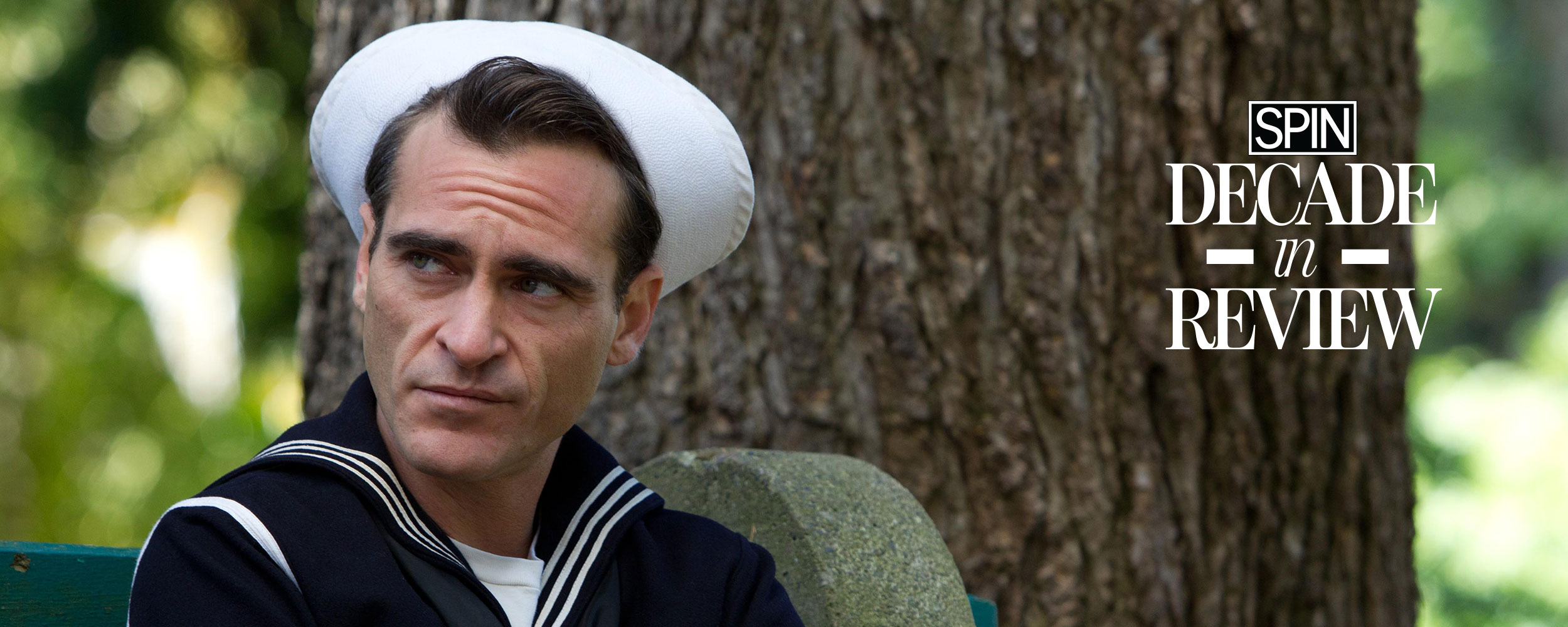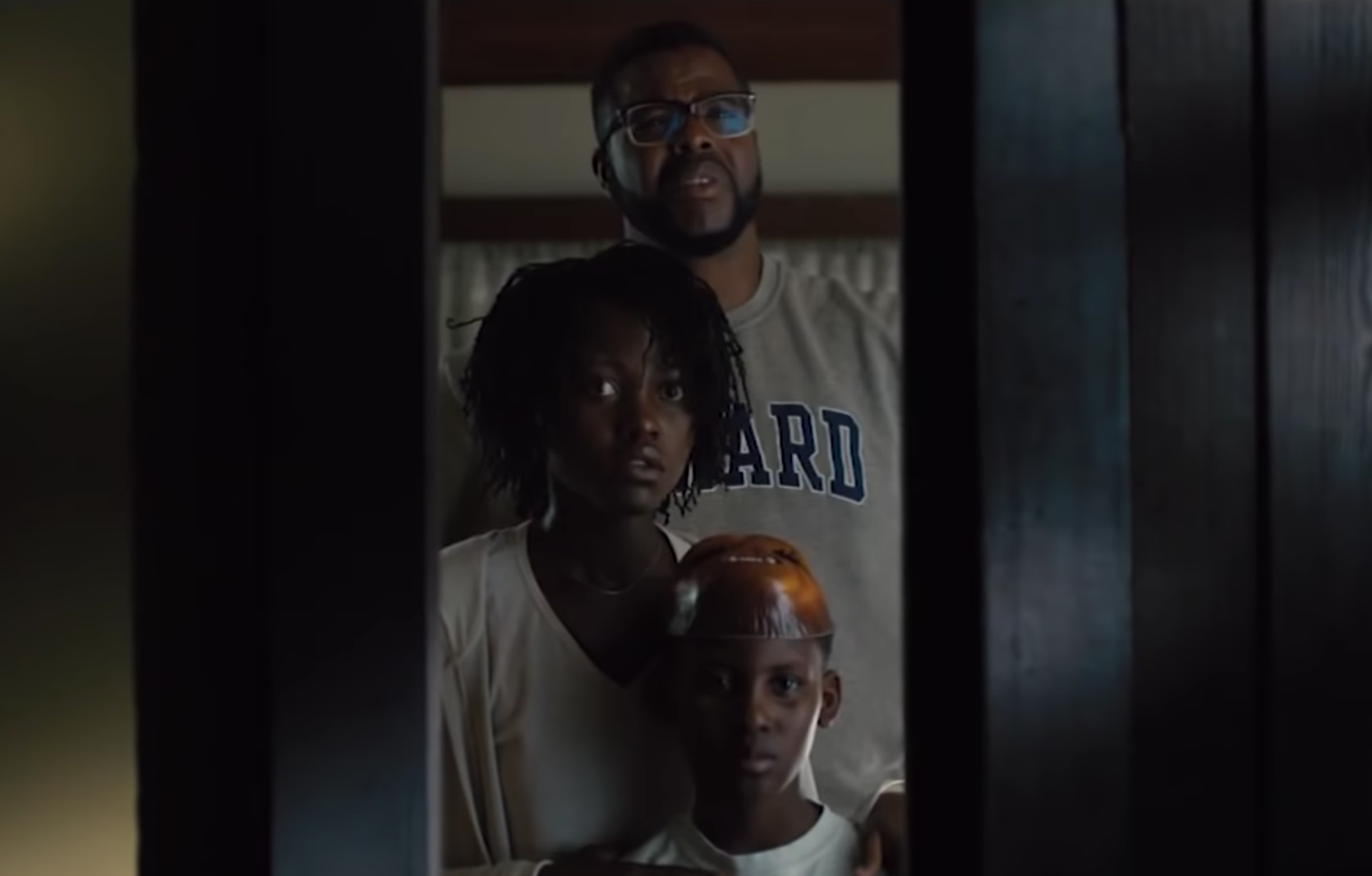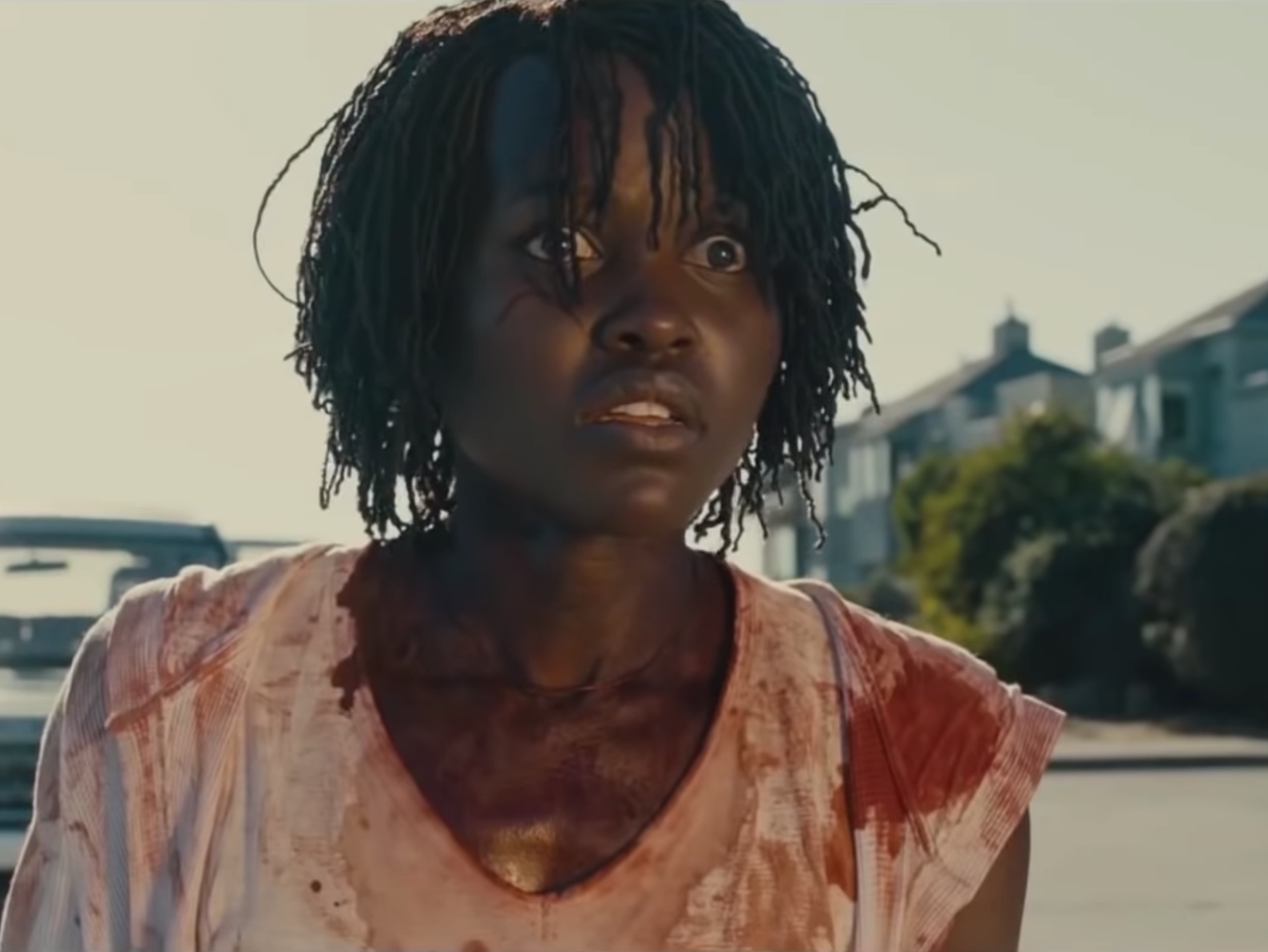When a movie is as massively popular and culturally significant as Get Out, choosing any given approach to making a follow-up is a risk. After that kind of monolithic success, there was no possibility that Jordan Peele’s next directorial effort wouldn’t feel like a disappointment to some major portion of Get Out’s fanbase. With that in mind, Peele took the best possible tack when approaching his next project. As writer, director, and producer (and because he made Get Out), it’s very clear that Peele had no one looking over his shoulder when filming and editing Us, his savagely unpredictable and more discombobulated sophomore effort. Every frame of this movie exudes this impression: Peele used his carte blanche to make a film that seems to be working its way through its own logic in real time—an inspired set of ideas poured into no clear formal mold. It’s one of the most perplexing films you’re likely to see in multiplexes this year.
Its climactic moments often happen in near darkness, shot at odd angles. There are redundancies, scenes that go on longer than expected, and Kubrick-like non-sequitur imagery. There is an unanticipated zoom-out of a third act that is jam-packed enough to feel like three more acts. People don’t die when they are supposed to. It’s strange, to say the least, but Peele made a gripping and playful film, rather than a tedious or pretentious one. Us actively subverts easy interpretation, but Peele is too light-hearted and humble a stylist to attempt any forced high-brow affectation. In its basic plot elements, Us feels like Peele trying to make his version of a John Carpenter sci-fi-horror film, in the vein of They Live. There are vestiges of home invasion B-movies, body-snatcher horror, and plenty of moves straight out of the playbook of the zombie movies of George Romero. Peele’s film develops out of a simple premise: A nuclear family goes on vacation to a lake house. The house brings up memories of the effective protagonist Adeline’s (Lupita Nyong’o) childhood there. Eventually, the monsters, seemingly conjured by the memories in the house, wreak havoc on the family. Ultimately, however, it seems like those agents of terror may be part of a bigger problem.
The speculative horror plot works on its own merits, but the script and visual motifs repeatedly suggest that an explicit allegory or extended metaphor is underpinning the whole project. (For instance, there’s an “It’s America” line that will nag at you—”Us”? “U.S.”?). As a result, the experience of watching Us for the first time is a frustrating scramble to map themes and double-meanings onto the action as it slip further and further away from our expectations. In this sense, Us feels like a provocation to those who loved Get Out for its airtight concept and structure. The earlier film was designed to make its audience feel uncomfortable not only because of the horror elements in the plot, but because of the resonances in it they recognized from their own lived experience, or perhaps, dark corners of their psychology. But there’s a comfort in that sort of non-ambiguousness of purpose, and Us actively does not provide us with it. Cryptic references and details—Hands Across America, Jeremiah 11:11, escalators, scissors, prison jumpsuits, bunnies?—play a dominant role. It seems as if Peele is hoping people will treat these Easter eggs as things to cross-reference and consider after the movie, eventually landing on their own interpretation of choice rather than searching for concrete proof of concept.

Also Read
30 Great Movies That Defined the 2010s
Making a movie in this way, obviously, necessarily leaves plenty of room for hole-poking and critique. Even if the messiness feels like a large part of the point and charm, there are plenty of moments in Us that feel like they could have been handled differently. One of the scenes in the film that seems intended to build maximum tension—a scene featuring Adelaide’s son Jason, his doppelganger, and a burning car by the beach—ends up as an overwrought anti-climax. A choice to score a scene with the Beach Boys’ “Good Vibrations” and N.W.A.’s “Fuck the Police” to illustrate a comic dichotomy seems a bit too kneejerk. The extended home-invasion section of the film is full of effective moments, but there’s a push and pull between slapstick and slasher terror that makes it feel like Peele isn’t going far enough in either direction.
There are also compelling elements that feel underexploited. One of the best images in the film is the shot directly before the credits roll, when the 1986 version of Adelaide is confronted with the back of her double’s head in the funhouse mirror; later, Jason draws a similar image of his head looking toward the back of the homeless man, or doomsday soothsayer, on the beach. There’s something that feels crucial about the film in that image: a fear of something familiar you cannot quite make out, a vast and unimaginable unknown, a figure walking behind another and imitating them. Sadly, for all the mirror images we see throughout the film—in literal mirrors, panes of glass, the surface of water, and more—the image does not continue to crop up.
Without these omissions and less-than-satisfying moments, though, it seems unlikely that Us would have managed to achieve the wider tone and pacing that makes it so disconcerting. They are part of Peele’s apparatus for constantly pulling the rug out from under the viewer. Get Out forced viewers to confront the ugliness of modern society by flipping stock horror movie tropes, creating pseudo-realistic situations, and realizing sharply drawn character types. Us does all of these things, but almost a bit too sparingly, leaving plenty of room for suggestion. Without much in the exposition to get bogged down by, Peele has maximum freedom to color outside the lines when the specific scare or lovingly composed shot calls for it. Unlike Get Out’s main players, Adelaide’s family are more functionaries than clearly drawn characters. Because Peele gives us a minimum of information prior to the proverbial funny games beginning, we have less of a framework for predicting where the plot is headed. The action leaves few moments to break up the horror and uncanniness—no room for the characters to pull themselves back from the action and try to convince themselves that things are actually fine. Us dials up to full apocalypse mode quickly, and that chaotic context allows Peele to make a film that is more about everything than something. Insofar as the film reflects aspects of our own reality, we feel it more than we comprehend it.
 Of course, there is no way that the nature of internet discourse in 2019 will not facilitate certain interpretations rising to the top of the heap and becoming accepted wisdom. “Us, Explained” headlines are already rampant on Google. But any attempt to essentialize the meaning of Us feels like a reflection of one of Peele’s clearest societal critiques within the movie: that there is a whole aspect of reality, and ourselves, that we disregard or smother out in order to understand the world, and live as we believe we are meant to. The Untethered do not allow themselves to relish the disorder that the Tethered have lived with their whole lives—all nature and no nuture. Their anarchic behavior moves outside of any clearly defined monster mythology (sometimes the Tethered seem to telekinetically align with the Untethered, sometimes they are just freeform boogeymen). Their behavior throws Adelaide’s family’s all-American vacation, the entire country, and the syntax of the film itself into disarray.
Of course, there is no way that the nature of internet discourse in 2019 will not facilitate certain interpretations rising to the top of the heap and becoming accepted wisdom. “Us, Explained” headlines are already rampant on Google. But any attempt to essentialize the meaning of Us feels like a reflection of one of Peele’s clearest societal critiques within the movie: that there is a whole aspect of reality, and ourselves, that we disregard or smother out in order to understand the world, and live as we believe we are meant to. The Untethered do not allow themselves to relish the disorder that the Tethered have lived with their whole lives—all nature and no nuture. Their anarchic behavior moves outside of any clearly defined monster mythology (sometimes the Tethered seem to telekinetically align with the Untethered, sometimes they are just freeform boogeymen). Their behavior throws Adelaide’s family’s all-American vacation, the entire country, and the syntax of the film itself into disarray.
Why not allow for that chaos as film watchers? Why impose clear readings on a film which feels built specifically to resist them? It’s a common and understandable instinct, and in this case, misguided. On the surface, Us resembles Get Out in many ways: It’s Peele making another fun hybrid of classic horror films for the millennial generation, while putting nuanced black characters at the forefront of a major motion picture that, as Peele put it in a recent interview, is a step toward “forg[ing] into the territory where a black family is just a black family and that’s it.” But Us works best when considered on its own terms, viewed as an arrangement of visual motifs and symbols, ones that take on new meanings for the viewer over time. It’s a riddle resembling an extended Twilight Zone episode. (It makes complete sense that Peele is producing the Twilight Zone reboot, which premieres on CBS next month.) Us is not unassailable, and it’s clear in its every frame that Peele did not want it to be. It may linger in your mind even longer than Get Out.




